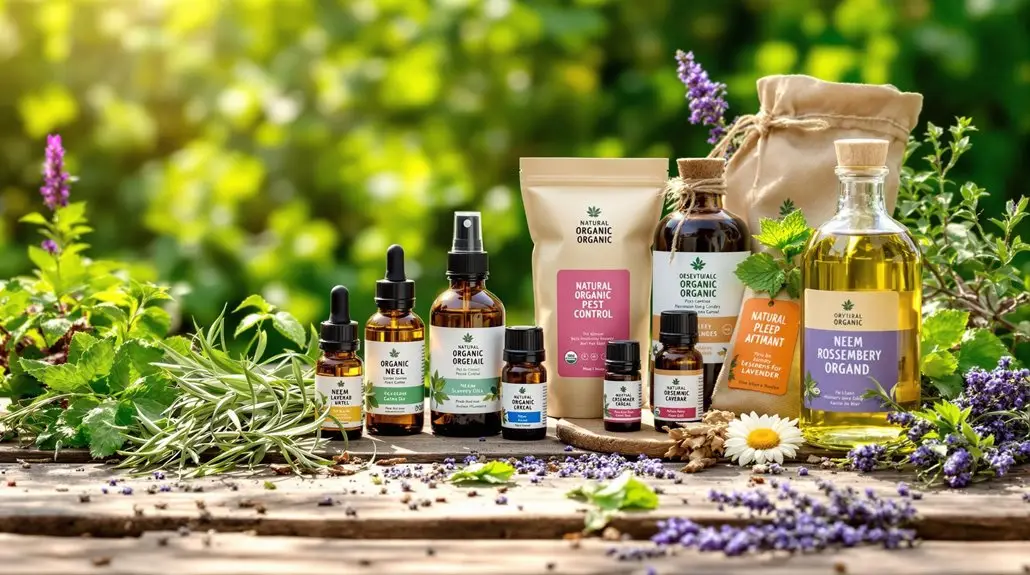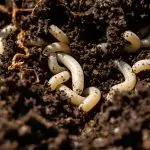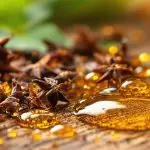You can find a variety of natural organic pest control products designed to keep your garden healthy and secure. Options like neem oil, insecticidal soaps, and diatomaceous earth effectively target pests while being eco-friendly. Retailers like Canadian Tire, Home Hardware, and local nurseries offer organic solutions, and you can also shop online at platforms like DoMyOwn.com or GrowOrganic.com. Many of these products not only control unwanted pests but also benefit your plants. Curious about the specific brands and tips for using these products effectively? There’s plenty more to discover!
Key Insights
- Neem Oil: A versatile organic solution that disrupts insect life cycles and promotes plant health while being non-toxic to wildlife.
- Insecticidal Soaps: Effective against soft-bodied pests like aphids, these biodegradable products are safe for most plants and easy to apply.
- Horticultural Oils: Lightweight oils, such as neem and petroleum, effectively smother pests while being non-toxic and suitable for organic gardening.
- Diatomaceous Earth: A natural powder that dehydrates crawling insects upon contact, it’s safe for humans and pets while providing effective pest control.
- Garlic Spray: A natural insecticide that repels a variety of pests with its strong odor, easy to make from homegrown garlic or store-bought cloves.
Types of Organic Pest Control
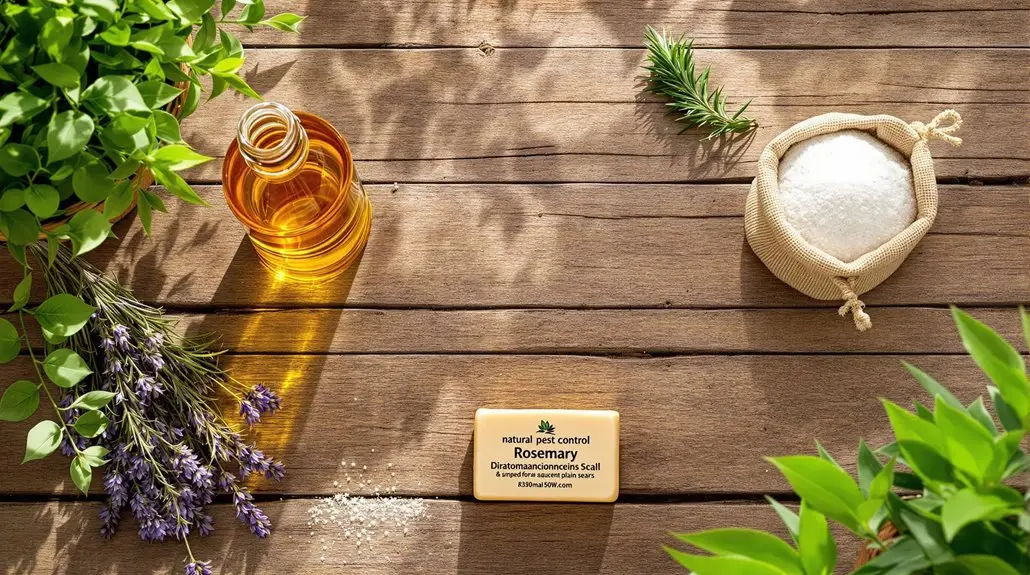
When it comes to keeping your garden free from nuisances, understanding the various types of organic pest control can make all the difference. You’ll find that biological control agents, horticultural oils, insecticidal soaps, and physical methods each offer unique solutions tailored to your garden’s needs.
Biological control agents, like Bacillus thuringiensis (Bt), target bothersome larvae, ensuring your plants remain healthy. Spinosad, another effective agent, tackles chewing insects but be cautious about timing its application to safeguard your bees. Beneficial microbes can also help restore your plants’ natural defenses, especially after using synthetic pesticides. Seasonal climate factors can also influence the efficacy of these agents, as pest populations may thrive or diminish depending on the weather. Additionally, employing eco-friendly pest control methods can further enhance the health of your garden ecosystem.
Horticultural oils, such as neem oil and lightweight petroleum oils, smother insects without harming your plants. These oils can deter pests from munching on your crops, giving you reassurance as you cultivate your garden.
Insecticidal soaps and essential oils provide another layer of defense. They effectively eliminate soft-bodied insects like aphids while being harmless for most plants. Using a product like EcoVia Botanicals can keep your garden thriving without harsh chemicals.
Lastly, don’t overlook physical and cultural methods. Installing deer fences or insect screens can shield your crops from larger pests. Using trap crops, like sunflowers, can attract unwanted insects away from your prized vegetables.
Common Natural Ingredients
Several common natural ingredients serve as effective pest control solutions, each with unique properties to keep your garden thriving. By utilizing these ingredients, you can maintain a healthy environment while deterring pests that threaten your plants. NaturePest emphasizes the importance of using organic pest control methods to ensure safety for both your garden and local wildlife.
Here’s a quick look at some powerful pest control ingredients:
| Ingredient | Properties |
|---|---|
| Neem Oil | Disrupts insect life cycle; non-toxic to wildlife |
| Peppermint Oil | Repels spiders and ants; easy to mix for spray |
| Diatomaceous Earth | Dehydrates pests; needs reapplication after rain |
| Garlic | Strong odor repels various pests |
| Marigolds | Contains natural insecticide (pyrethrum) |
Incorporating these ingredients into your pest control routine can be a game-changer. For instance, using neem oil not only helps manage insect populations but is also harmless for pets and wildlife. If you’re dealing with ants or spiders, a simple peppermint oil spray can do wonders. Furthermore, the use of natural pest control methods encourages sustainable practices that benefit both your garden and the environment.
Additionally, diatomaceous earth works effectively against crawling pests, while garlic can be spread around affected areas for its strong scent. Marigolds are not only beautiful but also act as a natural deterrent.
Pests Targeted by Products
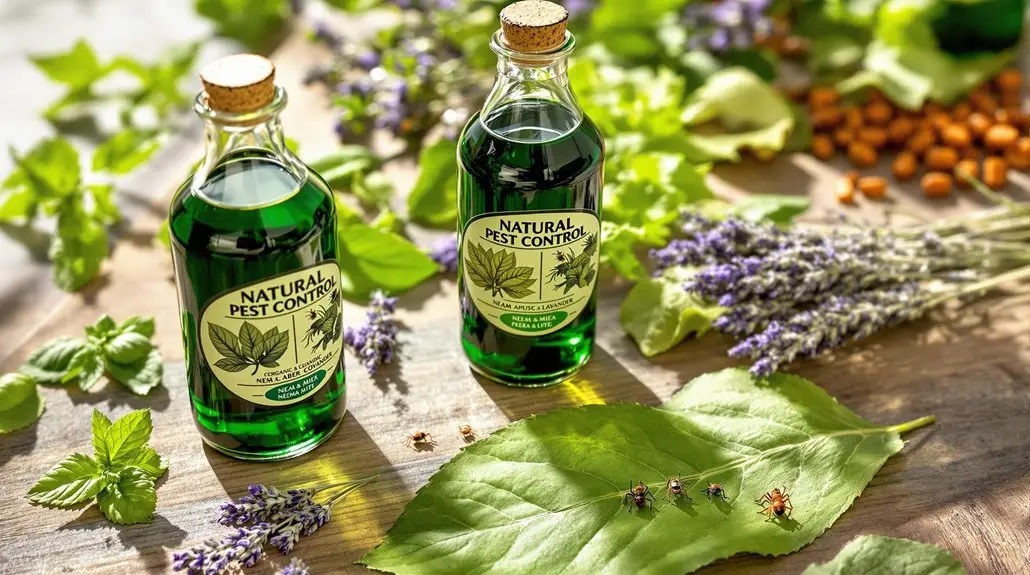
When you’re dealing with common household pests or garden challenges, knowing what you’re up against is essential. Seasonal pest issues can disrupt your plants and home, but the right organic products target a variety of nuisances effectively. Let’s explore the specific pests these natural solutions can handle. For instance, one product is effective against Aphids, Ants, and Thrips, disrupting their life cycle to maintain plant health. Additionally, pest identification is crucial to determine the most effective treatment options for your specific pest problems.
Common Household Pests
Many households face challenges with common pests that can disrupt daily life and pose health risks. From rodents to insects, these unwanted guests can invade your space, making it essential to understand who you’re dealing with. Here’s a quick overview of some of the typical household pests you might encounter:
| Pest Type | Description |
|---|---|
| Mice & Rats | Attracted to food and moisture, can contaminate and carry diseases. |
| Ants & Cockroaches | Seek out sweet foods and moisture, can trigger allergies and asthma. |
| Bed Bugs & Fleas | Parasitic insects causing discomfort and spreading diseases. |
| Spiders & Silverfish | Predatory and feed on smaller pests, some can be harmful. |
Understanding these pests can help you take action before they create bigger problems. Additionally, many of these pests can act as disease vectors, spreading pathogens that pose health risks to humans. By recognizing their habits and entry points, you can effectively utilize natural organic pest control products designed to target these nuisances. Integrated Pest Management (IPM) strategies can further enhance your pest control efforts by combining various methods for greater effectiveness. You want your home to be a sanctuary, free from these pests, and knowing who they are is the first step in reclaiming your space.
Garden Pest Challenges
Garden pest challenges can quickly turn your green oasis into a frustrating battleground, especially if you’re unaware of how to manage them effectively.
Identifying the pests in your garden is the first step toward reclaiming your space. Here are some common culprits you might encounter:
- Insect Pests: Aphids, caterpillars, and spider mites can wreak havoc on your plants. Use horticultural oil or neem oil to combat these invaders. Additionally, consider using natural products like essential oils that are effective and environmentally friendly.
- Slugs and Snails: These slimy pests thrive in moist conditions. Iron phosphate baits and copper wire barriers can help keep them at bay.
- Fungal and Bacterial Pests: Fungal infections like powdery mildew can be managed with baking soda solutions and proper garden hygiene.
- Other Garden Pests: Rabbits and grasshoppers can be deterred with onion and garlic sprays, while beneficial insects can help you maintain balance.
Seasonal Pest Issues
As seasons change, so do the pests that invade your home and garden. In spring, you might notice cockroaches sneaking in through cracks or ants forming colonies as they search for food. Fleas and ticks become more active, especially if you have pets, while mosquitoes thrive in standing water, turning your yard into their breeding ground. Regular shrub care can help maintain a healthy environment that deters these pests.
Once summer hits, mosquitoes reach peak activity, bringing the risk of diseases like Zika and West Nile virus. Flies multiply quickly, spreading germs, while bees and wasps could become aggressive. Rodents may seek cooler indoor spaces, and bed bugs can hitch a ride home with you after your travels. Notably, the launch of the Nature-Cide Rat & Mouse Control Product aims to provide an all-natural solution for dealing with these pests.
As fall approaches, rodents start searching for warm shelter, and you might see more cockroaches and spiders indoors. Mice prepare for winter, posing health risks, while raccoons and squirrels may invade your attic. Even in winter, rodents remain a nuisance, and cockroaches stay active in the warmth of your home. Bed bugs can still make an appearance post-holiday travel, while fleas and ticks may linger.
Knowing these seasonal pest issues helps you choose the right natural organic products to keep your space pest-free.
Where to Buy Products
When you’re ready to buy natural organic pest control products, you have plenty of options. You can shop at local retail stores or turn to online platforms for a wider selection. Whether you prefer the convenience of online shopping or the hands-on experience at a store, you’ll find products that fit your needs. Many products, such as the EcoSmart Home Pest Control, are available for both online purchase and in-store pickup, making it easy to choose what works best for you.
Retail Store Options
Numerous retail options are available for finding natural organic pest control products. Whether you prefer shopping at large chains or local stores, you have plenty of choices.
Here’s a quick list of places to check out:
- Canadian Tire – They carry Safer’s and other top brands for garden insect control.
- Home Hardware – Often stocks a variety of organic pest control products.
- Local Nurseries – These gems usually have a selection of organic options tailored for your local gardening needs.
- Home Depot – Availability varies by location, but some stores do carry organic pest control products.
When you visit these retailers, look for dedicated sections for organic gardening and pest control. Additionally, many of these products, like those from Safer’s, are designed to meet Canadian Organic Standards to ensure they are safe for your garden and the environment.
You’ll find specific aisles for natural products and customer service representatives ready to assist you. Labels and signage will help you easily identify what’s organic and eco-friendly.
Embracing natural pest control not only benefits your garden but also connects you with a community that values sustainability.
Online Purchase Platforms
Exploring online purchase platforms for natural organic pest control products opens up a world of convenience and variety. You’ll find numerous options that cater to your needs, whether you prefer well-known marketplaces or specialized stores. Here’s a quick look at some platforms you can explore:
| Platform | Specialty | Customer Feedback |
|---|---|---|
| The Home Depot Online | Variety of organic products | Ratings and reviews available |
| DoMyOwn.com | Focus on natural pest control | Customer feedback featured |
| GrowOrganic.com | Collection of organic pesticides | Includes customer ratings |
When you shop online, you’re not just buying products; you’re becoming part of a community that values sustainable practices. Many of these platforms also provide return and refund policies, ensuring you’re satisfied with your purchase. Nature-Cide, for example, offers a 30-day return policy. Additionally, many products like EcoVia insecticides are labeled as minimum risk under FIFRA 25 (b), providing peace of mind for users concerned about safety. So, plunge into these online platforms, read reviews, and discover the organic solutions that not only protect your home but also align with your values. Happy shopping!
Environmental Benefits
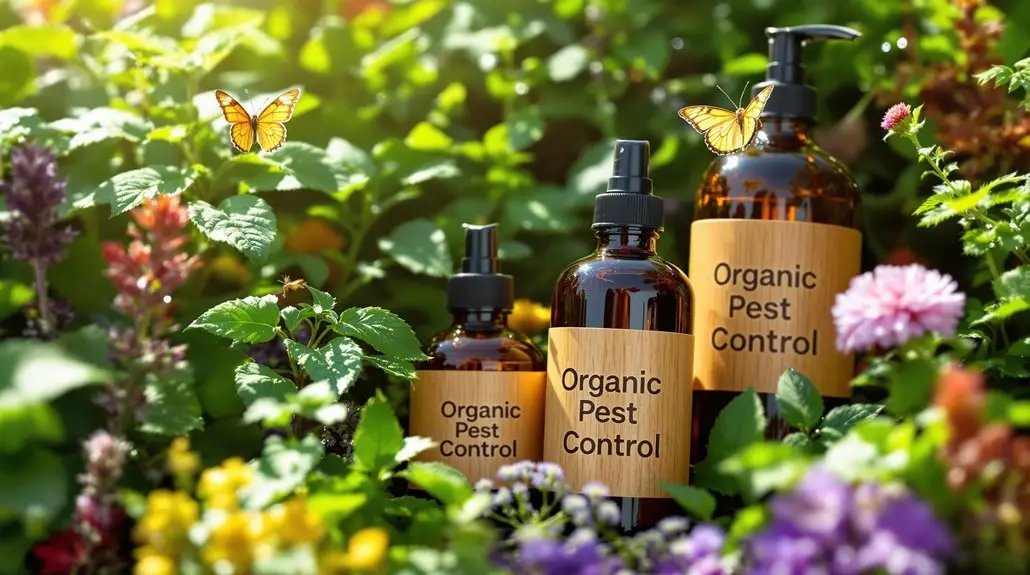
Organic pest control products offer significant environmental benefits that extend beyond just pest management. By choosing these natural solutions, you’re not only protecting your garden but also making a positive impact on the environment.
Here are some key benefits you can appreciate:
- No Harm to Non-Target Species: Unlike synthetic pesticides, organic products won’t harm beneficial insects, birds, or other non-target species. This helps maintain ecological balance.
- No Contamination of Water and Soil: Organic options are biodegradable and won’t leave harmful residues that can pollute water sources or degrade soil quality. You’re contributing to healthier ecosystems, as these products often utilize natural substances that break down safely.
- Protection of Pollinators: By using organic pest control, you’re safeguarding essential pollinators like bees and butterflies. These creatures play an important role in our food systems.
- Promotion of Sustainable Practices: Many organic methods, such as companion planting and using natural predators, encourage sustainable gardening practices. This focus on long-term solutions supports the environment for future generations.
Health and Safety Aspects
While enjoying the environmental benefits of organic pest control, it’s important to contemplate the health and well-being aspects of these products. Many natural pest control solutions are less toxic than their synthetic counterparts, but that doesn’t mean they’re entirely harmless. Ingredients like neem oil and diatomaceous earth have low toxicity levels, while others, such as pyrethrins, can be more potent and even harmful to certain beneficial insects, like bees.
When using natural pest control products, remember that they’re generally more secure for you and your pets, but they’re not completely non-toxic. Products like boric acid can pose risks if inhaled in high doses, and some natural pesticides, like those containing thyme oil, can create strong aromas that may be overwhelming indoors.
It’s essential to follow label instructions carefully to minimize risks. You should also be aware that these products often require more frequent applications and larger quantities, which can increase exposure risks.
If you’re dealing with a serious infestation, natural methods mightn’t always be sufficient, and professional pest control could be your best bet.
Certifications to Look For
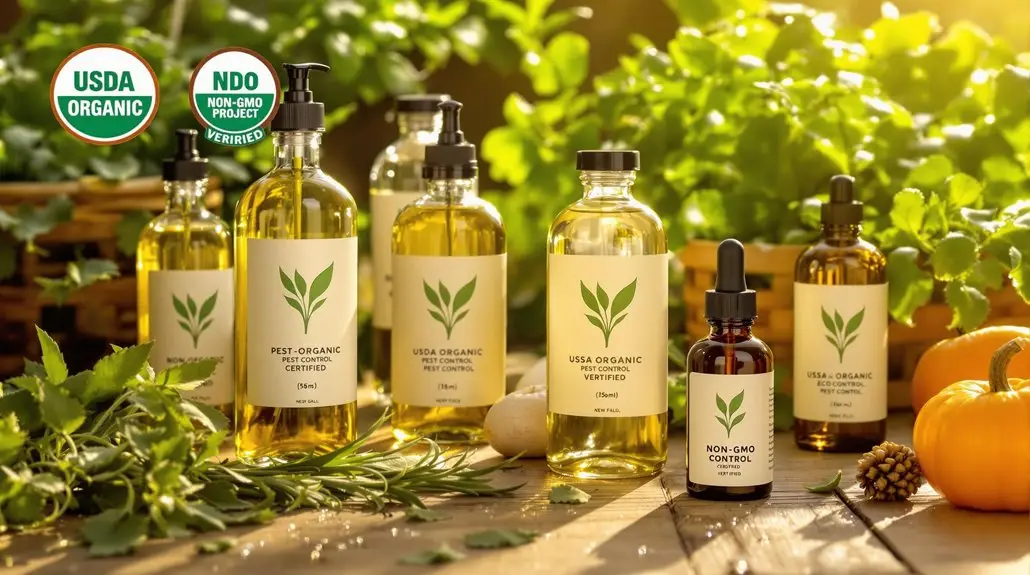
When seeking natural organic pest control products, it’s vital to look for specific certifications that guarantee quality and compliance with established standards.
These certifications not only confirm you’re choosing secure products, but they also align with your values of sustainability and environmental stewardship.
Here are four key certifications to keep an eye out for:
- USDA Organic Certification: Products must be certified by a USDA accredited certifying agent. This confirms adherence to the National Organic Program (NOP) standards, prohibiting synthetic fertilizers, GMOs, and certain pesticides.
- OMRI Listed: The Organic Materials Review Institute (OMRI) evaluates products for compliance with organic standards. If a product displays the OMRI logo, you can trust it’s secure for organic farming and gardening.
- EPA Approval: Look for products that have been approved by the Environmental Protection Agency (EPA). This guarantees that the product meets safety and efficacy standards for pest control.
- State Organic Certification: Various state departments of agriculture offer their own organic certifications. These can also provide assurance that the product meets local organic standards.
Popular Brands and Products
Exploring popular brands and products in natural organic pest control can help you make informed choices for your garden.
One standout option is Natria Ready-to-Use Neem Oil Spray, which is ready to use right out of the bottle. It kills pests on contact and keeps working for up to 14 days. If you prefer a more concentrated solution, Pure Neem Oil contains azadirachtin, effectively targeting a wide range of insects when ingested.
For those dealing with immature pests, Clarified Hydrophobic Neem Oil suffocates grubs and caterpillars, providing a strong defense.
Another effective choice is Monterey Garden Insect Spray, which harnesses the power of spinosad. This product eradicates pests like fire ants and thrips quickly, with residual effects lasting 2-4 weeks. Just remember to apply it early in the morning or late in the evening to protect beneficial insects like bees.
For a biological approach, consider Monterey B.t. Biological Insecticide. It selectively targets caterpillars and worms while being harmless for other beneficial insects.
If you’re looking for simpler solutions, Safer Brand Insect Killing Soap** and horticultural oil** are great for soft-bodied pests and can be used frequently.
Finally, iron phosphate is a reliable option for controlling slugs and snails.
Each of these products offers unique benefits, making it easier for you to find the right fit for your gardening needs.
Tips for Effective Use
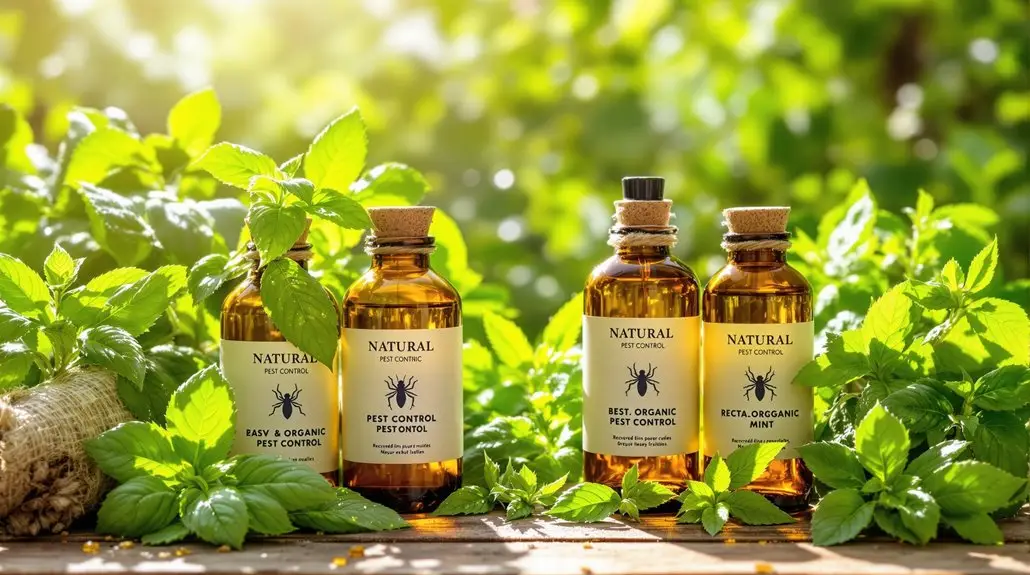
Using natural organic pest control products effectively requires a thoughtful approach. To guarantee you’re making the most of these eco-friendly solutions, keep in mind the following tips:
1. Select Wisely: Choose products derived strictly from natural sources and targeted specifically at the pest species you’re dealing with. Consider the ecosystem and opt for natural repellents like peppermint, rosemary, and thyme.
2. Follow Instructions: Adhere to the application intervals as specified on the label. Natural pesticides often need more frequent applications, so be prepared to reapply as needed, typically on a weekly or bi-weekly basis.
3. Think Environmentally: Always prioritize the health of your family and pets. Avoid products that, despite being natural, can be dangerous, such as nicotine.
Select products that promote soil health and protect beneficial insects.
4. Monitor and Adjust: Keep an eye on pest populations and be ready to adjust your application strategies. If you face a more complex infestation, don’t hesitate to consult a professional for effective and reliable solutions.
Frequently Asked Questions
Are Natural Pest Control Products Safe for Edible Plants?
Yes, natural pest control products are generally secure for edible plants.
You’ll find options like neem oil and horticultural oil that protect your plants without harming you or your pets.
Iron phosphate baits target slugs without affecting beneficial organisms.
Just remember to follow application instructions carefully to avoid plant damage.
How Long Do the Effects of Organic Pest Control Last?
The effects of organic pest control typically don’t last long.
You’ll find that these products often require frequent reapplications, especially after rain or harsh weather.
Factors like temperature, moisture, and UV light can shorten their effectiveness.
If you’re targeting specific pests, you may need to adapt your strategy for better results.
Can I Make My Own Natural Pest Control Solutions at Home?
Absolutely, you can make your own natural pest control solutions at home!
Start by mixing essential oils like peppermint or tea tree with water and a bit of soap for effective sprays. You can also blend herbs like garlic or cayenne into powders.
Vinegar mixed with water works great too! Just remember to test your solutions on a small area first and keep them away from pets and kids.
It’s a fun, secure way to keep pests at bay!
Are There Any Side Effects of Using Essential Oils for Pest Control?
Did you know that some essential oils can induce mortality in non-target organisms, like certain parasitoids?
While using essential oils for pest control can be effective, they also come with side effects that might surprise you.
These oils can cause skin rashes or allergic reactions, especially in children. Plus, ingestion can be poisonous.
Always follow safety guidelines and store oils securely, ensuring you and your loved ones stay protected while enjoying nature’s benefits.
How Do I Choose the Right Product for My Specific Pest Problem?
To choose the right product for your specific pest problem, start by identifying the pest you’re dealing with and understanding its habits.
Research natural ingredients that effectively target that pest. Check for certifications and read reviews to gauge effectiveness.
Consider the product’s security for pets and kids, and evaluate its environmental impact.
Conclusion
In a world where pests invade like tiny armies, natural organic pest control products from NaturePest Holistic Pest Control stand as your mighty shield! With just a few sprays, you can transform your garden into a pest-free paradise, where plants flourish like never before. So go ahead, embrace the power of NaturePest’s finest ingredients and watch those bothersome intruders vanish as if they were never there. Join the eco-friendly movement and become the hero your garden deserves—try NaturePest Holistic Pest Control today!

